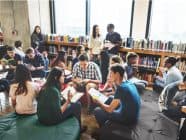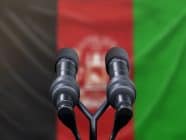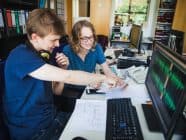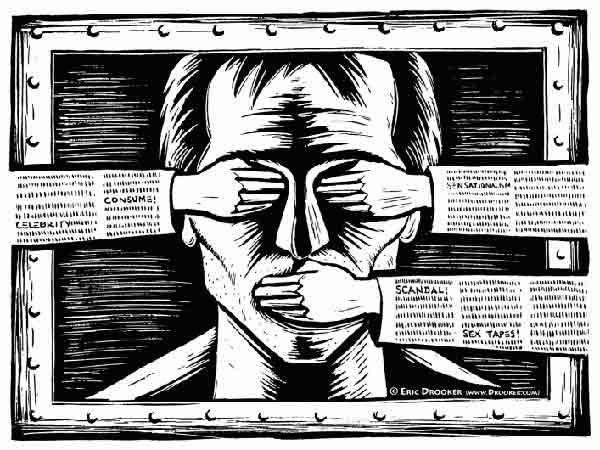I teach the Journalistic Interview course at the University of Oregon School of Journalism and Communication. Over the last few years I have been unable to find an up-to-date text to augment my classroom lectures and student assignments. Many of the books I encountered that analyze and explain the craft, and those that offer guidance regarding interviewing basics, are dated (or worse, superficial).
Daydreaming at a faculty meeting one afternoon I looked across the table and realized that our School is a think tank for the interview. Since the 1970s the Journalistic Interview has been integral to our curriculum. Our review of the history of the course suggests that ours was the first journalism program to offer an academic opportunity to study the interview as a crucial element for journalism education.
In the months following that eureka moment in the faculty meeting, I secured first promises and then manuscripts from over two dozen Oregon colleagues, manuscripts we’ve compiled into the groundbreaking text, Interviewing: The Oregon Method. The book is a collection of practical and analytical chapters from professional interviewers, scholars and teachers. Each chapter takes a focused look at a wide range of issues, including interview ethics, the sanctity of quotes, interviewing in the virtual world, negotiating identity and building rapport. Interviewing binds years of experience into a collection of chapters designed to train novices and invigorate old hands.
Longtime newspaper columnist Bob Welch preaches trust in his chapter. “The idea is to gather the richest possible ingredients to serve readers,” he writes about reporting. “To that end, understanding the subcurrents of the human relationship can only help us do that better.” Some authors state the obvious; the obvious that too often is forgotten. After a step-by-step series of lessons in interview basics, instructor Mark Blaine reminds readers to respect interviewees’ time “by acknowledging it with a short note thanking them.”
Instructor Lisa Heyamoto offers a controversial approach when she advocates what she calls “chameleon interviewing” to her students. “The journalist,” offers this veteran newspaper reporter, should adapt to the shifting landscape. “Changing your style to complement your source is a great way to create a comfortable environment, and is most likely to yield the information you need.”
From paying attention to numbers to listening carefully to answers, from linguistic and cultural sensitivity to ethics and privacy, the book guides readers through the challenging contemporary world of questions and answers. Contributors include Pulitzer Prize-winning reporter Professor Alex Tizon, retired Seattle Times executive editor Mike Fancher, former Oregonian managing editor Jack Hart and lecturer Charles Jaco. Jaco was the St. Louis TV reporter whose question elicited from a Missouri senate candidate a famous response that there was so called illegitimate rape and “legitimate rape.” But, the reporter notes in his chapter, he was thinking ahead to his next question and missed an opportunity to follow-up on the legislator’s remark. “There were plenty of lessons learned for journalists,” Jaco writes in his chapter about his oversight, and he teaches them in the book.
Interviewing is a primer for the digital age (it details the options for interviewing in the virtual world via avatars) yet one that embraces age-old lessons that make clear the vital importance of successful interviewing techniques for productive civic engagement.
If you wish to consider Interviewing for yourself or your students, the book is distributed by the Oregon State University Press (http://osupress.oregonstate.edu/book/interviewing)-. We invite you to check out the book trailer here: http://vimeo.com/108080849
Our authors contributed their essays to the project pro bono because profits go to fund scholarships for University of Oregon School of Journalism and Communication students who specialize in the study of the interview.
As Mark Zusman, editor of Willamette Week, the Pulitzer Prize-winning newspaper in Portland, Oregon, says, “There is no more important skill for reporters to have than a knack for interviewing. For a very, very small number of us, it comes naturally. For the rest of us, we now have Interviewing: The Oregon Method, a crash course from a cast of experts.”
Pic credit: Flikr: Chris Richards
Tags: Journalism Education












































